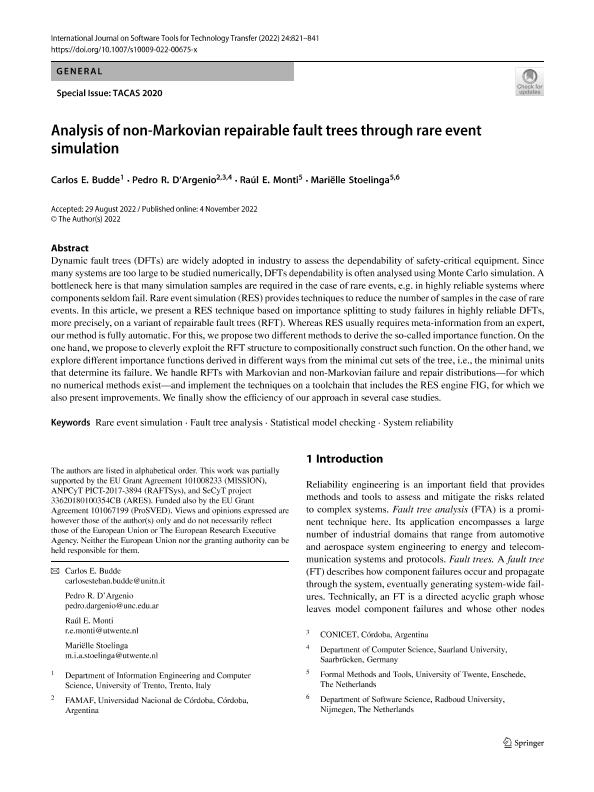Mostrar el registro sencillo del ítem
dc.contributor.author
Budde, Carlos Esteban

dc.contributor.author
D'argenio, Pedro Ruben

dc.contributor.author
Monti, Raúl Enrique

dc.contributor.author
Stoelinga, Mariëlle
dc.date.available
2023-06-16T17:20:44Z
dc.date.issued
2022-10
dc.identifier.citation
Budde, Carlos Esteban; D'argenio, Pedro Ruben; Monti, Raúl Enrique; Stoelinga, Mariëlle; Analysis of non-Markovian repairable fault trees through rare event simulation; Springer Science and Business Media Deutschland GmbH; International Journal on Software Tools for Technology Transfer; 24; 5; 10-2022; 821-841
dc.identifier.issn
1433-2779
dc.identifier.uri
http://hdl.handle.net/11336/200874
dc.description.abstract
Dynamic fault trees (DFTs) are widely adopted in industry to assess the dependability of safety-critical equipment. Since many systems are too large to be studied numerically, DFTs dependability is often analysed using Monte Carlo simulation. A bottleneck here is that many simulation samples are required in the case of rare events, e.g. in highly reliable systems where components seldom fail. Rare event simulation (RES) provides techniques to reduce the number of samples in the case of rare events. In this article, we present a RES technique based on importance splitting to study failures in highly reliable DFTs, more precisely, on a variant of repairable fault trees (RFT). Whereas RES usually requires meta-information from an expert, our method is fully automatic. For this, we propose two different methods to derive the so-called importance function. On the one hand, we propose to cleverly exploit the RFT structure to compositionally construct such function. On the other hand, we explore different importance functions derived in different ways from the minimal cut sets of the tree, i.e., the minimal units that determine its failure. We handle RFTs with Markovian and non-Markovian failure and repair distributions—for which no numerical methods exist—and implement the techniques on a toolchain that includes the RES engine FIG, for which we also present improvements. We finally show the efficiency of our approach in several case studies.
dc.format
application/pdf
dc.language.iso
eng
dc.publisher
Springer Science and Business Media Deutschland GmbH
dc.rights
info:eu-repo/semantics/openAccess
dc.rights.uri
https://creativecommons.org/licenses/by-nc-sa/2.5/ar/
dc.subject
FAULT TREE ANALYSIS
dc.subject
RARE EVENT SIMULATION
dc.subject
STATISTICAL MODEL CHECKING
dc.subject
SYSTEM RELIABILITY
dc.subject.classification
Ciencias de la Computación

dc.subject.classification
Ciencias de la Computación e Información

dc.subject.classification
CIENCIAS NATURALES Y EXACTAS

dc.title
Analysis of non-Markovian repairable fault trees through rare event simulation
dc.type
info:eu-repo/semantics/article
dc.type
info:ar-repo/semantics/artículo
dc.type
info:eu-repo/semantics/publishedVersion
dc.date.updated
2023-06-15T18:05:23Z
dc.identifier.eissn
1433-2787
dc.journal.volume
24
dc.journal.number
5
dc.journal.pagination
821-841
dc.journal.pais
Alemania

dc.description.fil
Fil: Budde, Carlos Esteban. Universidad Nacional de Córdoba. Facultad de Matemática, Astronomía y Física; Argentina. Consejo Nacional de Investigaciones Científicas y Técnicas; Argentina. Universita degli Studi di Trento; Italia
dc.description.fil
Fil: D'argenio, Pedro Ruben. Consejo Nacional de Investigaciones Científicas y Técnicas; Argentina. Universitat Saarland; Alemania. Universidad Nacional de Córdoba. Facultad de Matemática, Astronomía y Física; Argentina
dc.description.fil
Fil: Monti, Raúl Enrique. Universidad Nacional de Córdoba. Facultad de Matemática, Astronomía y Física; Argentina. Consejo Nacional de Investigaciones Científicas y Técnicas; Argentina. Universiteit Twente (ut);
dc.description.fil
Fil: Stoelinga, Mariëlle. Universiteit Twente (ut); . Radboud Universiteit Nijmegen; Países Bajos
dc.journal.title
International Journal on Software Tools for Technology Transfer
dc.relation.alternativeid
info:eu-repo/semantics/altIdentifier/doi/http://dx.doi.org/10.1007/s10009-022-00675-x
dc.relation.alternativeid
info:eu-repo/semantics/altIdentifier/url/https://link.springer.com/article/10.1007/s10009-022-00675-x
Archivos asociados
